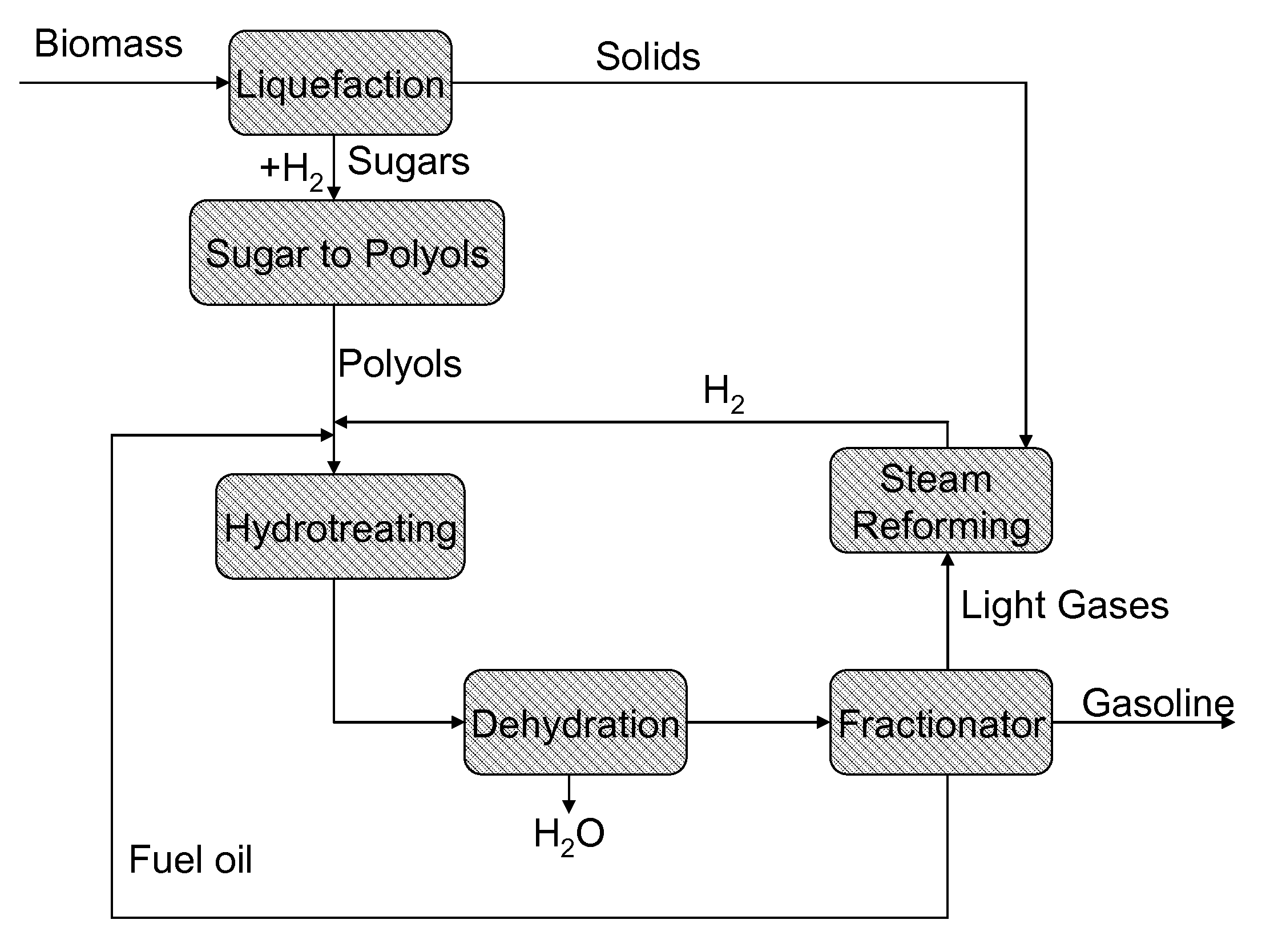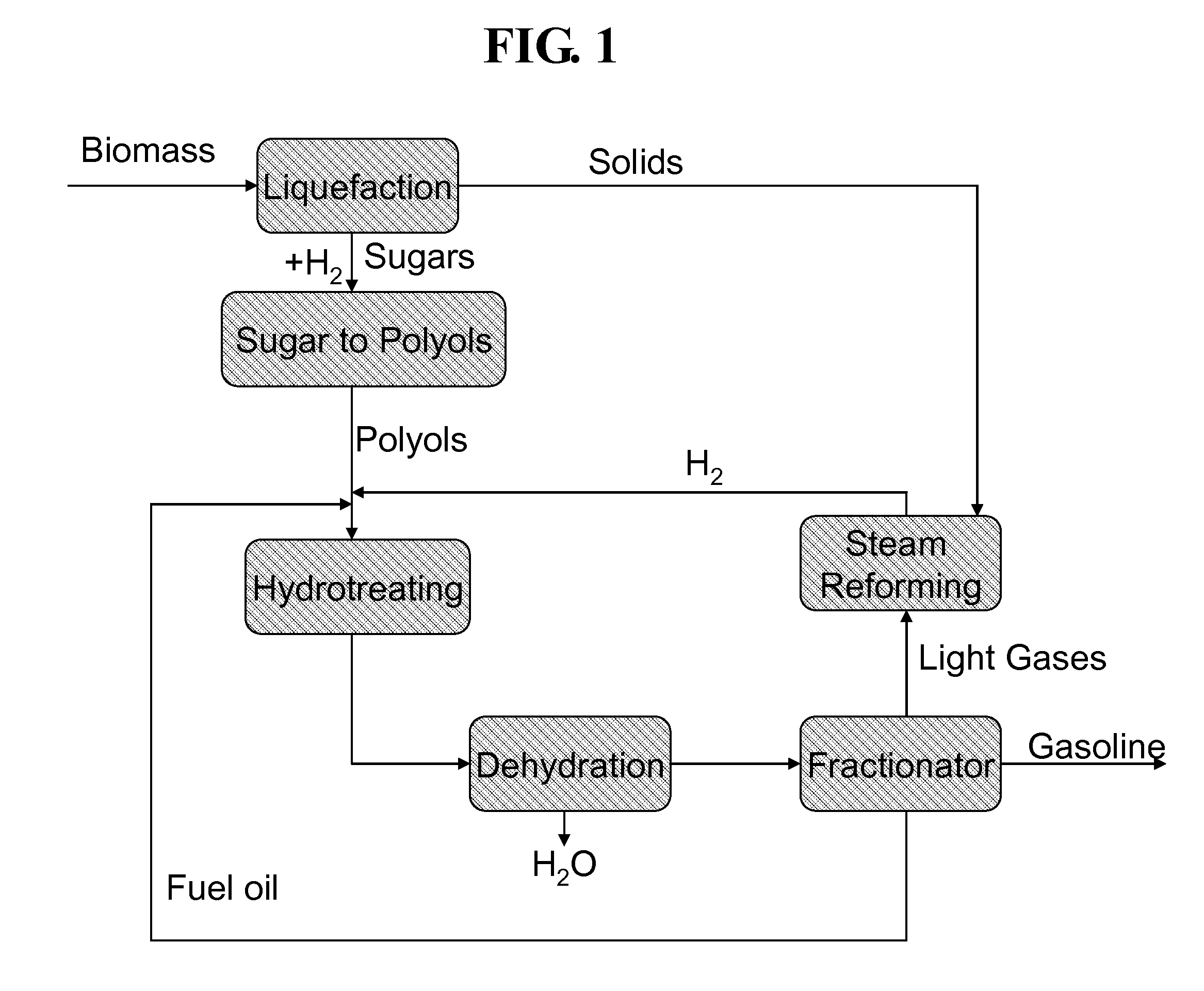Hydrotreating carbohydrates
- Summary
- Abstract
- Description
- Claims
- Application Information
AI Technical Summary
Benefits of technology
Problems solved by technology
Method used
Image
Examples
example 1
Hydrotreating Sorbitol to Hexanes / Alkanes
[0044]Experiments indicate that hydrotreating a mixture of an aqueous solution of sorbitol and diesel over a commercial hydrotreating catalyst produces hexanes and lighter hydrocarbons. Tests were run over a commercially available Co / Mo catalyst on an alumina support with a feed consisting of 70% sorbitol in water mixed with diesel spiked with a small concentration of dimethyl sulfide. One run had temperature at 700° F. and pressure at 900 psig; another had temperature at 600° F. and pressure at 1200 psig.
TABLE 2Hydrotreating SorbitolTemperature (° F.)700Pressure (psig)900Sorbitol conversion %99.9Products (C mol %)C1-C428.1C5+67.1CO + CO24.8Reaction conditions: 20 ml / hr Diesel + 10 ml / hr sorbitol solution (70% sorbitol / 30% water), 700° F., 900 psig, 300 ml / min H2, 25 g Co / Mo catalyst.
[0045]Bench scale tests were run over a commercial Co / Mo on alumina catalyst with a polyol feedstock consisting of 70% sorbitol in water solution and a fuel oil ...
example 2
Hydrogen Production
[0049]A steady supply of hydrogen is required for the hydrotreating process of sugar alcohols to gasoline hydrocarbons. Although hydrogen may be available from other sources, it is frequently expensive and energy intensive. To improve the efficiency and decrease the cost of hydrotreating biomass polyols, H2 is produced in a separate reactor by steam reforming the light gases produced from hydrotreating sorbitol and diesel.
[0050]Although hydrotreating requires excess H2 for an efficient reaction, there was a minimal effect found as long as the mole ratio of H2 / sorbitol was greater than about 12 mol H2 per mol sorbitol in the feed (Table 6).
TABLE 6Hydrogen / Sorbitol Determination.H2 / Sorbitol mole ratio2512.56.2Conversion %99.799.998.8Selectivity (C mol %)C1-C418.620.512.9C5+81.078.079.6CO + CO20.41.57.5Reaction conditions: Catalyst: 25 g Co / Mo catalyst;Feed: 20 ml / hr Diesel feedstock + 10 ml / hr sorbitol solution.
example 3
Increasing Octane
[0054]Octane rating or Research Octane Number (RON) is dependent upon the type of fuels produced and quantity of each in the final mixture. A fuel of pure HEX has a research octane rating of approximately 25 while pure MCP has a research octane rating of approximately 90. Mixtures of HEX and MCP can have octane ratings between 25 and 90 RON.
[0055]Polyol and diesel feedstocks were mixed before contacting with a Co / Mo catalyst on alumina support. Polyol feedstock containing approximately 70% sorbitol was mixed with a fuel feedstock mixture from a diesel hydrotreater. The low sulfur diesel feedstock mixture was spiked with a very small amount of dimethyl sulfide.
[0056]The ratio of MCP to HEX increases from 0.12 to 0.60 for run at 600° F. and 1200 psig compared to run at 700° F. and 900 psig. Raising the temperature to 700° F. and above produces methyl cyclopentane in place of normal hexane. This dramatically increases the octane value of the product. The process requir...
PUM
 Login to View More
Login to View More Abstract
Description
Claims
Application Information
 Login to View More
Login to View More - R&D
- Intellectual Property
- Life Sciences
- Materials
- Tech Scout
- Unparalleled Data Quality
- Higher Quality Content
- 60% Fewer Hallucinations
Browse by: Latest US Patents, China's latest patents, Technical Efficacy Thesaurus, Application Domain, Technology Topic, Popular Technical Reports.
© 2025 PatSnap. All rights reserved.Legal|Privacy policy|Modern Slavery Act Transparency Statement|Sitemap|About US| Contact US: help@patsnap.com



